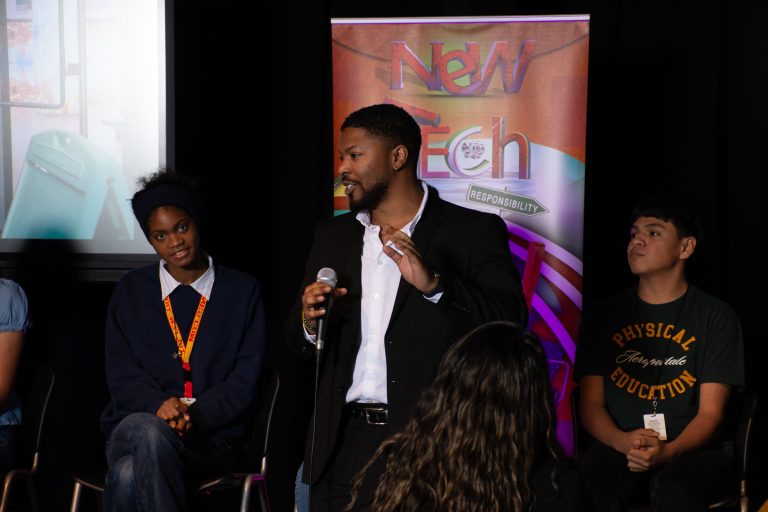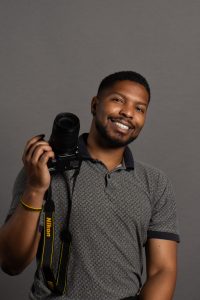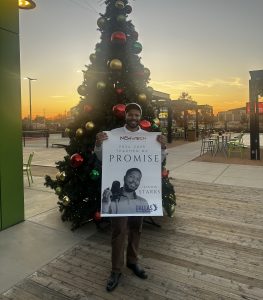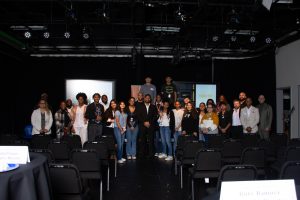For years, a state-of-the-art film and music facility at New Tech High School at B.F. Darrell sat unused until Trenton Starks brought it to life when he became the school’s film teacher.
The school’s film pathway, which Starks said is Dallas ISD’s hidden gem, was the vision of Channel Hutchinson, principal at New Tech.
“Initially, our career pathways were only in animation,” she said. “I worked with school leadership to add a pathway in film. We now have film, animation and gaming.”
Starks has taken the facility and created a comprehensive film program and student film festival. This has given students access to a professional studio, sound stage, networking opportunities and real-world film experiences.
“I came in getting the kids adjusted to editing,” Starks said. “I told them, ‘you have to crawl before you walk.’ I had them start recording and start telling their own stories. A saying we have here is ‘creating without boundaries.’”
As a former athlete, Starks wanted to become a coach and expected his career to go in the direction of sports. After taking on creative projects and creating visual stories around the sports he loved, he began to uncover his true passion in media and film.
This career shift eventually led him to becoming a teacher at New Tech, where he has used his previous four years of teaching experience, along with his skills in creative marketing, software and videography to establish the film program, which fits in well with the school’s approach to learning.
Starks credits his parents for his success throughout his career change. He earned the recognition of 2024-2025 Teacher of Promise on his campus, excelling in both the classroom and the school community.
“This entire school uses project-based learning.” Starks said. “We emphasize collaboration, so every project they do, students are working in a team.”
Starks created a curriculum for students that takes them through the full process of filmmaking from concept to postproduction.
“At the beginning, I teach them how to do a treatment plan or a concept document,” he said. “They learn how to storyboard. They learn how to write scripts, and they learn how to create mood boards.”
He gives his students autonomy over their production teams, reminding them of the importance of committing to those roles.
After spending his first year laying the foundation for the film program, Starks saw an opportunity and a need for the students to showcase their work.
In April of 2024, he led the school in hosting its first film festival. It took place in the school’s auditorium but included all the elements of a festival from posters to a red carpet.
“We want them to get a chance to see what it’s like to actually be in a film festival,” Starks said, “to actually have their limelight and for students to be able to express their voices.”
This year, the film festival will be held off-campus at Bishop Arts Theatre Center, where the students will be able to showcase their work beyond their school community.
Based on last year’s success, Starks has been working on growing the program. He has created opportunities for students to develop a strong portfolio and resume. Students have also participated in internships at the Pegasus Film Festival, which is the largest student-led film festival in the nation, conveniently located in Dallas.
“I push my kids to go to college, but at the same time I’m developing a real-world pipeline for those who are not,” Starks said.
By helping his students succeed in the industry, Starks is also creating representation.
According to the UCLA Hollywood diversity report, 6% of writers, directors and producers in the country are Black. Starks said he hopes to change that narrative by teaching his students different ways to tell their own stories. He challenges them to find value in their everyday lives through writing, literature, cinematography or sound design.
By being a teacher, he is also contributing to increasing the representation of African American males in the classroom—only 1.3% of educators are African American men.
“I prefer to work in minority spaces, especially because the first high school I taught at in Louisiana was 90% Black,” he said. “I had zero Black teachers growing up. I don’t want that same situation to happen for my kids. I want them to have a Black male teacher—a young one that looks like them. I want to be there for them as they progress.”




